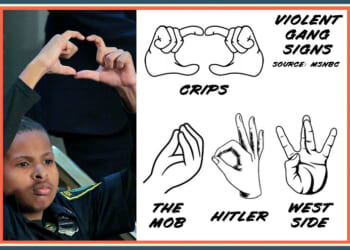
Audience members are continuing to laugh at an antisemitic lyric about Jewish people in Broadway’s “Cabaret” — and lead actor Adam Lambert even recently reprimanded a theatergoer for giggling.
We hear that during a recent performance, the star scolded an audience member during the tune, “If You Could See Her,” in which Lambert’s emcee character sings a love song to a gorilla — ending with the gut-punch line, “If you could see her through my eyes she wouldn’t look Jewish at all.”
A witness tells us that Lambert, without breaking character, turned to the laughing patron in the crowd and said, “No. This is not comedy. Pay attention.”
Podcaster David Rigano — who was in the audience — documented the incident on Instagram, describing the audience reaction as, “not nervous laughter, not shocked laughter, but people who found the surprise that it was a Jewish gorilla legitimately funny.”
Some who were at the show also weighed in on the social media post.
Another witness stated, “I was at this performance and was so beyond glad [Lambert] said what he said. It was horrific that he had paused and the audience began to laugh harder and harder. Scary.”
Another comment read: “I was there too. It really was hard to hear [people] laugh for so long at that line. Adam did a great job.”
A different commenter who’d been at another performance, chimed in, “When that scene happened my friend and I turned to one another and were in shock. Me being Jewish, was in awe by the laughter and just said to my friend ‘that’s not funny, people shouldn’t be laughing.’ We are thankful that [Lambert] didn’t break character and expressed how it’s not a joke nor something to laugh at.”
Lambert has responded on social media by saying, “I really consider it a privilege to be working with such a gifted cast and creative team on a show that has so much to say about what is happening RIGHT NOW.”
He added: “It’s been relevant since it premiered in the late 60′s and I HOPE audiences walk away THINKING and feeling empathy towards how marginalized groups can be scapegoated as political strategy… That’s my hope and motivation every show; to pull you into an irresistible community and then make you miss us as we are stolen from you. Maybe just maybe we can change some minds.”
Page Six previously reported that the show, set at the seedy Kit Kat Club during the rise of fascism in Weimar-era Germany, has had issues with audiences laughing, and that Lambert had been glaring at the alleged offenders.
A source told Page Six back in November that Lambert, “paused and had to ‘stare down’ audience members who laughed inappropriately at the [line].”
“He gave the guy the iciest death stare I’ve ever seen,” a witness said.
We hear this is the first time Lambert has verbally reprimanded someone.
Joel Grey, who starred in the original “Cabaret” wrote an essay in the New York Times in November calling out the shocking shift in audience reactions to the musical’s themes.
“When we first performed it . . . audiences gasped and recoiled,” Grey wrote. “It was too offensive, too raw, too cruel. I’m hearing from friends in the current Broadway production of ‘Cabaret’ that the line is once again getting an audible response, but of a different sort.”
Grey added, “My initial assessment, when word first reached me about this unusual reaction, was that these must be the triumphant laughs of the complicit, suddenly drunk on power and unafraid to let their bigotry be known. Now I find myself considering other hypotheses. Are these the hollow, uneasy laughs of an audience that has retreated into the comfort of irony and detachment? Are these vocalized signals of acceptance? Audible white flags of surrender to the state of things? A collective shrug of indifference?”
“I honestly don’t know which of these versions I find most ominous, but all of them should serve as a glaring reminder of how dangerously easy it is to accept bigotry when we are emotionally exhausted and politically overwhelmed,” he wrote.
The show’s rep confirmed that audiences have been laughing at the line, saying, “It is chilling lyric, not a funny lyric. This is a new development.”











